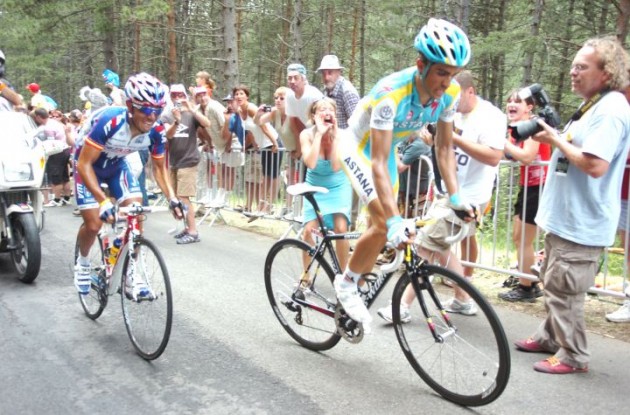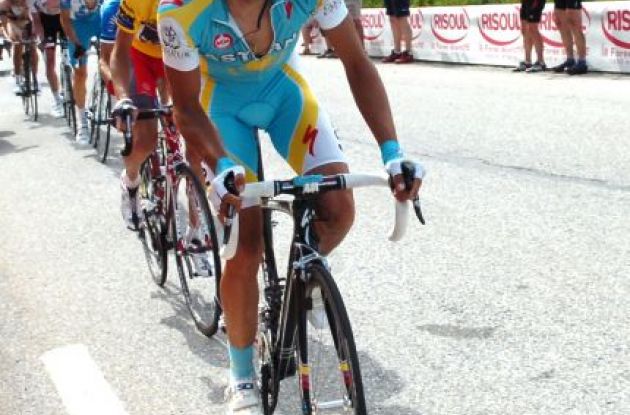Spanish Authorities Accept Alberto Contador's Contaminated Meat Defense
Spanish cycling authorities have accepted Alberto Contador's defense that his positive Tour de France doping test resulted from eating contaminated meat, Contador's spokesman said Thursday.
Spanish cycling authorities have accepted Alberto Contador's defense that his positive Tour de France doping test resulted from eating contaminated meat, Contador's spokesman said Thursday.
The Spanish federation has proposed a one-year ban for Contador, rather than the standard two-year penalty, after his positive clenbuterol test at last year's Tour.
Contador spokesman Jacinto Vidarte said on Thursday that the federation accepted Contador's contention that the result was due to "unintentional ingestion" of the banned substance.
If the ban is adopted, Contador would be stripped of the Tour title and miss this year's race.
Contador confirmed the proposed sanction Wednesday in a statement released by his spokesman. He said the Spanish federation's disciplinary committee informed him of the proposed one-year ban.
"I'm motivated and focused on my work," Contador said Thursday from the Saxo Bank team training camp in Palma de Mallorca. "It's the most important thing right now. Regardless of what's going on around you, you've got to work. That's what brings you rewards in the future."
Contador has until Feb. 9 to present more evidence before the Spanish federation's disciplinary committee renders a final verdict. That decision can be appealed to the Court of Arbitration for Sport by Contador, the International Cycling Union (UCI) or the World Anti-Doping Agency.
Contador has vowed to appeal any ban.
The UCI said Thursday the proposed ban "cannot in any way be considered as an anticipation of the definitive decision in the case."
"To date, Alberto Contador has not received a sanction and the UCI still awaits ... to be informed of the decision of the RFEC Disciplinary Commission that should be provided as soon as possible," the Swiss-based body said in a statement.
In Paris, Tour race director Christian Prudhomme wouldn't speculate on Contador's status as reigning champion before a decision is reached but said he can't imagine the rider getting off without any punishment.
"I struggle to see how we could arrive at a non-sanction," he said. "But there again we will have to wait because he has the possibility to appeal. But I hope we're the closest possible to the conclusion now."
Contador says meat he ate on a rest day during the tour in July that provided the minute trace of clenbuterol. He is expected to speak Friday at a news conference with Saxo Bank team boss Bjarne Riis.
Contador's case highlights a growing concern that the drug can also be consumed unwittingly from eating bad meat. While clenbuterol accelerates fat burning and muscle growth to make it an attractive feed additive, sports performance enhancer and slimming drug, it is also on WADA's zero-tolerance list.
Dutch anti-doping scientist Douwe de Boer, whom Contador hired to help his defense, said he expects appeals.
"It is a kind of compromise which is not a solution" for anybody, De Boer said of the one-year-proposal, "because Contador will not agree with that and probably the WADA will not agree."
Contador's case isn't unique.
Italian cyclist Alessandro Colo received a one-year ban after an Italian tribunal accepted his argument that bad meat caused his positive clenbuterol test. German table tennis player Dimitrij Ovtcharov also used the same defense after testing positive for the drug, but WADA is appealing the German body's decision not to sanction him.
Colo tested positive for clenbuterol last April at the Tour of Mexico but secured a reduced sentence. He said the UCI has appealed to CAS over the one-year ban by the Italian Olympic Committee in October.
"CONI even wrote in their formal decision that it was very possible," Colo told the AP in a phone interview Thursday. "But they also wrote that I should have known clenbuterol was commonly found in Mexican meat and that I should have instead relied on protein mixes."
If stripped of the 2010 Tour victory, the title would go to runner-up Andy Schleck of Luxembourg. A one-year ban means Contador wouldn't have to surrender 70 percent of his salary, unlike a two-year ban.
Contador would not only miss next year's Tour if the ban is upheld, he would miss out on participating in the Spanish Vuelta by only three days because the one-year ban would end on Aug. 23. The ban would be retroactive to Aug. 24 of last year - the day he was informed of the positive control.
Contador also won Tour titles in 2007 and 2009. He was forced to sit out the Tour in 2006 and 2008 after his teams were implicated in doping cases. The 28-year-old Spaniard is only the fifth cyclist to win Tour, Giro d'Italia and Vuelta titles in a career.
"The team has backed me a lot. You've got to think of it that way," Contador said of his Saxo Bank team. "Things are going well and I'm lucky to be here. I've never had such good preparation as I've had this year.
"Over the three days here, I've trained incredibly well. Whatever improvements we make are very important. Races are decided by a matter of seconds."









